| Listing 1 - 7 of 7 |
Sort by
|
Book
ISBN: 9788836130702 8836130704 Year: 2020 Publisher: Alessandria : Edizioni dell'Orso.
Abstract | Keywords | Export | Availability | Bookmark
 Loading...
Loading...Choose an application
- Reference Manager
- EndNote
- RefWorks (Direct export to RefWorks)
Seven against Thebes (Greek mythology) in literature --- Statius, P. Papinius --- Tydeus --- Polynices --- Polineikes --- Polinice --- Polinices --- Polinik --- Poliniko --- Polinizes --- Polyneices --- Polyneikēs --- Polynice --- Polynikes --- Полінік --- ポリュネイケース --- פוליניקס --- 폴리네이케스 --- Полиник --- Палінік --- Πολυνείκης --- In literature. --- Stace (0040?-0096). --- Stace --- Critique et interprétation. --- Statius, Publius Papinius --- Estacio --- Statius, Papinius --- Stat︠s︡iĭ, Publiĭ Papiniĭ --- Стаций, Публий Папиний --- Stazio
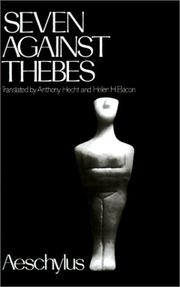
ISBN: 1280605693 0198020155 9780198020158 9780195017328 0195017323 9781911535751 1911535757 0195070070 0195017323 9780195070071 9786610605699 6610605696 9781280605697 Year: 1991 Publisher: New York Oxford University Press
Abstract | Keywords | Export | Availability | Bookmark
 Loading...
Loading...Choose an application
- Reference Manager
- EndNote
- RefWorks (Direct export to RefWorks)
The formidable talents of Anthony Hecht, one of the most gifted of contemporary American poets, and Helen Bacon, a classical scholar, are here brought to bear on this vibrant translation of Aeschylus' much underrated tragedy The Seven Against Thebes. The third and only remaining play in a trilogy dealing with related events, The Seven Against Thebes tells the story of the Argive attempt to claim the Kingdom of Thebes, and of the deaths of the brothers Eteocles and Polyneices, each by the others hand. Long dismissed by critics as ritualistic and lacking in dramatic tension, Seven Against Thebes is revealed by Hecht and Bacon as a work of great unity and drama, one exceptionally rich in symbolism and imagery.
Seven against Thebes (Greek mythology) --- Mythology, Greek. --- Greek mythology --- Polynices --- Eteocles, --- Thebes (Greece) --- Étéocle, --- Eteoklēs, --- Eteoklo, --- 厄忒俄克勒斯, --- Етеокл, --- Етеокле, --- Этеокл, --- エテオクレース, --- אטאוקלס --- 에테오클레스, --- اتئوکلس --- Ἐτεοκλῆς, --- Polineikes --- Polinice --- Polinices --- Polinik --- Poliniko --- Polinizes --- Polyneices --- Polyneikēs --- Polynice --- Polynikes --- Полінік --- ポリュネイケース --- פוליניקס --- 폴리네이케스 --- Полиник --- Палінік --- Πολυνείκης --- Thēvai (Greece) --- Thívai (Greece) --- Thebes (Greece : Ancient city) --- Thiva (Greece) --- Thēva (Greece) --- Tebe (Greece) --- Theben (Greece) --- Thebes (Greece : Extinct city) --- Θῆβαι (Greece) --- Thēbai (Greece) --- Θήβα (Greece)
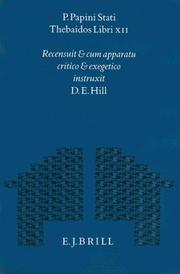
ISBN: 9004105840 9004328157 Year: 1996 Publisher: Leiden Brill
Abstract | Keywords | Export | Availability | Bookmark
 Loading...
Loading...Choose an application
- Reference Manager
- EndNote
- RefWorks (Direct export to RefWorks)
This is a reprint of an edition first published in 1983. It includes a list of corrections which have come to light since then. The edition includes a Praefatio which sheds light on the relationship between the major manuscripts; there is also a full apparatus which reports the significant readings from fresh collations of the major manuscripts, and established a text based on a full account, with discussion where necessary, of all important suggestions published before 1980 or suggested privately to the editor. It also includes an appendix which lists all variant readings known to the editor but which are unlikely to be helpful in establishing a text. The edition will be the starting point for any serious work on the epic.
Classical Latin literature --- classics [discipline] --- Seven against Thebes (Greek mythology) --- Seven against Thebes --- Thebes, Seven against (Greek mythology) --- Mythology, Greek --- Polynices --- Eteocles, --- Polineikes --- Polinice --- Polinices --- Polinik --- Poliniko --- Polinizes --- Polyneices --- Polyneikēs --- Polynice --- Polynikes --- Étéocle, --- Eteoklēs, --- Eteoklo, --- Полінік --- ポリュネイケース --- פוליניקס --- 폴리네이케스 --- Полиник --- Палінік --- Πολυνείκης --- Thebes (Greece) --- Greece --- Thēvai (Greece) --- Thívai (Greece) --- Thebes (Greece : Ancient city) --- Thiva (Greece) --- Thēva (Greece) --- Tebe (Greece) --- Theben (Greece) --- Thebes (Greece : Extinct city) --- Θῆβαι (Greece) --- Thēbai (Greece) --- Θήβα (Greece)
Book
ISBN: 9783110245929 3110245922 9783110245936 3110245930 1282885197 9786612885198 9781282885196 661288519X Year: 2010 Volume: 6 Publisher: Berlin ; Boston De Gruyter
Abstract | Keywords | Export | Availability | Bookmark
 Loading...
Loading...Choose an application
- Reference Manager
- EndNote
- RefWorks (Direct export to RefWorks)
Euripides' Phoenissae bears one of the richest tragic plots: multiple narrative levels are interwoven by means of various anachronies, focalizers offer different and often challenging points of view, while a complex mythical matrix is deftly employed as the backdrop against which the exploration of the mechanics of tragic narrative takes place. After providing a critical perspective on the ongoing scholarly dialogue regarding narratology and drama, this book uses the former as a working tool for the study and interpretation of the latter. The Phoenissae is approached as a coherent narrative unit and issues like the use of myth, narrators, intertext, time and space are discussed in detail. It is within these contexts that the play is seen as a Theban mythical 'thesaurus' both exploring previous mythical ramifications and making new additions. The result is rewarding: Euripides constructs a handbook of the Theban saga that was informative for those mythically untrained, fascinating for those theatrically demanding, but also dexterously open upon each one's reception.
Narration (Rhetoric) --- Seven against Thebes (Greek mythology) in literature. --- Polyneices (Greek mythology) --- Eteocles (Greek mythology) --- Euripides. --- Thebes (Greece) --- In literature. --- Eteocles (Greek mythology). --- Euripides. Phoenician women. --- Narration (Rhetoric). --- Polyneices (Greek mythology). --- Thebes (Greece) -- In literature. --- Seven against Thebes (Greek mythology) in literature --- Languages & Literatures --- Greek & Latin Languages & Literatures --- Narrative (Rhetoric) --- Narrative writing --- Thēvai (Greece) --- Thívai (Greece) --- Thebes (Greece : Ancient city) --- Thiva (Greece) --- Thēva (Greece) --- Tebe (Greece) --- Theben (Greece) --- Thebes (Greece : Extinct city) --- Θῆβαι (Greece) --- Thēbai (Greece) --- Θήβα (Greece) --- Rhetoric --- Discourse analysis, Narrative --- Narratees (Rhetoric) --- Polynices --- Eteocles, --- Étéocle, --- Eteoklēs, --- Eteoklo, --- 厄忒俄克勒斯, --- Етеокл, --- Етеокле, --- Этеокл, --- エテオクレース, --- אטאוקלס --- 에테오클레스, --- اتئوکلس --- Ἐτεοκλῆς, --- Polineikes --- Polinice --- Polinices --- Polinik --- Poliniko --- Polinizes --- Polyneices --- Polyneikēs --- Polynice --- Polynikes --- Полінік --- ポリュネイケース --- פוליניקס --- 폴리네이케스 --- Полиник --- Палінік --- Πολυνείκης --- Greek Tragedy. --- Interpretation. --- Narratology. --- Phoenissae.
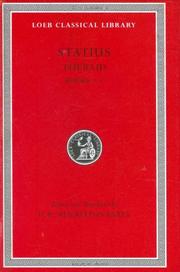
ISBN: 0674012089 0674012097 9780674012097 9780674012080 Year: 2003 Volume: 207 2 Publisher: Cambridge: Harvard university press,
Abstract | Keywords | Export | Availability | Bookmark
 Loading...
Loading...Choose an application
- Reference Manager
- EndNote
- RefWorks (Direct export to RefWorks)
Seven against Thebes (Greek mythology) --- Epic poetry, Latin --- Languages & Literatures --- Greek & Latin Languages & Literatures --- Eteocles (Greek mythology) --- Polyneices (Greek mythology) --- Translations into English --- Poetry --- Rome --- History --- Polynices --- Eteocles, --- Thebes (Greece) --- Thēvai (Greece) --- Thívai (Greece) --- Thebes (Greece : Ancient city) --- Thiva (Greece) --- Thēva (Greece) --- Tebe (Greece) --- Theben (Greece) --- Thebes (Greece : Extinct city) --- Θῆβαι (Greece) --- Thēbai (Greece) --- Θήβα (Greece) --- Étéocle, --- Eteoklēs, --- Eteoklo, --- 厄忒俄克勒斯, --- Етеокл, --- Етеокле, --- Этеокл, --- エテオクレース, --- אטאוקלס --- 에테오클레스, --- اتئوکلس --- Ἐτεοκλῆς, --- Polineikes --- Polinice --- Polinices --- Polinik --- Poliniko --- Polinizes --- Polyneices --- Polyneikēs --- Polynice --- Polynikes --- Полінік --- ポリュネイケース --- פוליניקס --- 폴리네이케스 --- Полиник --- Палінік --- Πολυνείκης --- Epic poetry, Latin - Translations into English --- Seven against Thebes (Greek mythology) - Poetry --- Rome - History - Domitian, 81-96 - Poetry. --- Rome - History - Domitian, 81-96 - Poetry
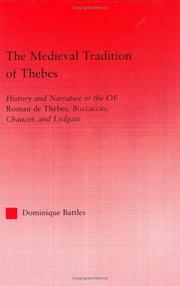
ISBN: 1135879494 1135879508 1280154403 020350285X 9780203502853 9786610154401 6610154406 9780415969932 041596993X 041596993X 9781135879501 9781280154409 9781135879457 9781135879495 0203606361 Year: 2004 Publisher: New York Routledge
Abstract | Keywords | Export | Availability | Bookmark
 Loading...
Loading...Choose an application
- Reference Manager
- EndNote
- RefWorks (Direct export to RefWorks)
The first comprehensive study of the classical legend of Thebes in the Middle Ages.
Literature, Medieval --- Seven against Thebes (Greek mythology) in literature. --- Narration (Rhetoric) --- Sibling rivalry in literature. --- Rhetoric, Medieval. --- History and criticism. --- History --- Polyneices --- Eteocles, --- Étéocle, --- Eteoklēs, --- Eteoklo, --- 厄忒俄克勒斯, --- Етеокл, --- Етеокле, --- Этеокл, --- エテオクレース, --- אטאוקלס --- 에테오클레스, --- اتئوکلس --- Ἐτεοκλῆς, --- Polineikes --- Polinice --- Polinices --- Polinik --- Poliniko --- Polinizes --- Polyneikēs --- Polynice --- Polynikes --- Полінік --- ポリュネイケース --- פוליניקס --- 폴리네이케스 --- Полиник --- Палінік --- Πολυνείκης --- Thebes (Greece) --- Thēvai (Greece) --- Thívai (Greece) --- Thebes (Greece : Ancient city) --- Thiva (Greece) --- Thēva (Greece) --- Tebe (Greece) --- Theben (Greece) --- Thebes (Greece : Extinct city) --- Θῆβαι (Greece) --- Thēbai (Greece) --- Θήβα (Greece) --- In literature. --- Eteocles (Greek mythology) --- Polyneices (Greek mythology) --- Rhetoric, Medieval --- Seven against Thebes (Greek mythology) in literature --- Sibling rivalry in literature --- History and criticism --- Polynices --- Rhetoric --- Discourse analysis, Narrative --- Narratees (Rhetoric)
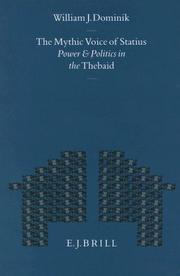
ISBN: 9004099727 9004329412 9789004099722 Year: 1994 Volume: 136 Publisher: Leiden: Brill,
Abstract | Keywords | Export | Availability | Bookmark
 Loading...
Loading...Choose an application
- Reference Manager
- EndNote
- RefWorks (Direct export to RefWorks)
This is the first thematic study of Statius' Thebaid to be published in monograph form in English in the past twenty years. It examines in detail the thematic design and intent of the Thebaid and considers the question of its contemporary relevance. The book focuses on the central theme of power — how it is exercised on the supernatural and human levels and the consequences of its pursuit and abuse in terms of the human condition. An ensuing discussion explores the political undercurrents of the epic. This discussion is in four main parts: (1) 'Use and Abuse of Supernatural Power'; (2) 'Pursuit and Abuse of Monarchal Power'; (3) 'Consequences of the Abuse of Power'; and (4) 'Political Relevance to Contemporary Rome'. The views expressed represent a fundamental departure from previous studies and constitute a critical reassessment of the Thebaid . The provision of translations makes the book accessible to the Latinless reader.
Statius, Publius Papinius --- Seven against Thebes (Greek mythology) in literature --- Political poetry, Latin --- Epic poetry, Latin --- Power (Social sciences) in literature --- Politics and literature --- Sept contre Thèbes (Mythologie grecque) dans la littérature --- Poésie politique latine --- Poésie épique latine --- Pouvoir (Sciences sociales) dans la littérature --- Politique et littérature --- History and criticism --- Histoire et critique --- Statius, P. Papinius --- Seven against Thebes (Greek mythology) in literature. --- Power (Social sciences) in literature. --- Sibling rivalry in literature. --- Polyneices (Greek mythology) --- Eteocles (Greek mythology) --- History and criticism. --- -Epic poetry, Latin --- -Power (Social sciences) in literature --- -Literature --- Literature and politics --- Literature --- Latin epic poetry --- Latin poetry --- Latin political poetry --- Political aspects --- Thebes (Greece) --- In literature. --- Publius Papinius Statius --- Statius, Papinius --- Stace --- -History and criticism --- Eteocles (Greek mythology). --- Polyneices (Greek mythology). --- Sept contre Thèbes (Mythologie grecque) dans la littérature --- Poésie politique latine --- Poésie épique latine --- Pouvoir (Sciences sociales) dans la littérature --- Politique et littérature --- Sibling rivalry in literature --- Thēvai (Greece) --- Thívai (Greece) --- Thebes (Greece : Ancient city) --- Thiva (Greece) --- Thēva (Greece) --- Tebe (Greece) --- Theben (Greece) --- Thebes (Greece : Extinct city) --- Θῆβαι (Greece) --- Thēbai (Greece) --- Θήβα (Greece) --- Epic poetry, Latin. --- Literature. --- Political poetry, Latin. --- Politics and literature. --- Belles-lettres --- Western literature (Western countries) --- World literature --- Philology --- Authors --- Authorship --- Polynices --- Eteocles, --- Polineikes --- Polinice --- Polinices --- Polinik --- Poliniko --- Polinizes --- Polyneices --- Polyneikēs --- Polynice --- Polynikes --- Étéocle, --- Eteoklēs, --- Eteoklo, --- Полінік --- ポリュネイケース --- פוליניקס --- 폴리네이케스 --- Полиник --- Палінік --- Πολυνείκης --- Thebais (Statius, P. Papinius) --- P. Papini Stati Thebaidos libri XII (Statius, P. Papinius) --- Thebaidos libri XII (Statius, P. Papinius) --- Tebaida (Statius, P. Papinius) --- Greece --- Rome (Empire) --- Byzantine Empire --- Italy --- Rim --- Roman Empire --- Roman Republic --- Rome --- Romi (Empire)
| Listing 1 - 7 of 7 |
Sort by
|

 Search
Search Feedback
Feedback About UniCat
About UniCat  Help
Help News
News